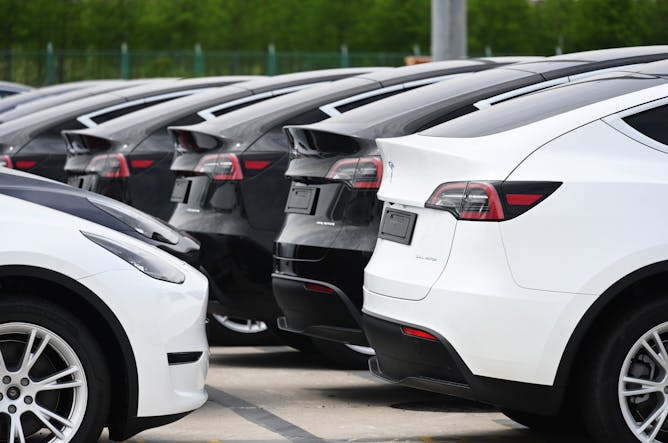|
The U.S. Senate on Sunday passed its largest climate and clean energy spending bill ever, including $370 billion in incentives to ramp up renewable energy, increase energy efficiency in homes, and expand electric vehicle use and other energy technologies. The bill, now headed to the House, would also extend the Affordable Care Act and lower drug prices.
If every climate-related part of the bill comes to fruition, it could cut U.S. greenhouse gas emissions 40% by 2030 compared to 2005 levels. But as environmental studies professor Jay Horton explains, one requirement in the bill could make a crucial incentive almost impossible to use – tax breaks for buying electric vehicles.
Also today:
|

|
Stacy Morford
Environment + Climate Editor
|
|

Today’s EVs rely heavily on China and other countries for materials.
Shen Chunchen/VCG via Getty Images
James Morton Turner, Wellesley College
No electric vehicle maker currently meets all the bill’s supply chain requirements, not even Tesla. One big reason: China.
|
Education
|
-
Henry Tran, University of South Carolina; Douglas A. Smith, Iowa State University
Looser requirements for teacher certification don’t fix teachers’ problems, which are low pay, high workload and lack of respect.
|
|
Health + Medicine
|
-
Rebecca S.B. Fischer, Texas A&M University
While the majority of monkeypox cases thus far have been recorded among men who have sex with men, everyone is still at risk of contracting the disease.
|
|
Science + Technology
|
-
George Grispos, University of Nebraska Omaha; Austin C. Doctor, University of Nebraska Omaha
Bringing advanced technologies to the ancient practice of farming could help feed the world’s growing population, but it could also open the door for people looking to disrupt the global food system.
-
Richard Futrell, University of California, Irvine
A language scientist explains that talking was never invented but has evolved over hundreds of thousands of years.
|
|
Arts + Culture
|
-
James Walker, Saint Xavier University; Judith R. Hiltner, Saint Xavier University
Legendary broadcaster Red Barber took a chance on Scully when he asked him to be an announcer for the Brooklyn Dodgers. Three years later, Scully was the voice of the World Series.
|
|
Politics + Society
|
-
Thaddeus L. Johnson, Georgia State University; Natasha N. Johnson, Georgia State University
New research on police departments across the country reveals a significant link between the use of fatal force and college education – the more educated are less likely to use it.
|
|
Ethics + Religion
|
-
Sumit Ganguly, Indiana University
The fate of the so-called princely states was a particularly contentious issue during India’s partition, which killed about 1 million people and left millions more displaced.
|
|
Economy + Business
|
-
David Lont, University of Otago; Martien Lubberink, Te Herenga Waka — Victoria University of Wellington; Paul Griffin, University of California, Davis
Rising temperatures are having an impact on every aspect of people’s lives. Business is not immune to the volatile weather.
|
|
|
|
|
|
| |
| |
| |
| |
|
|